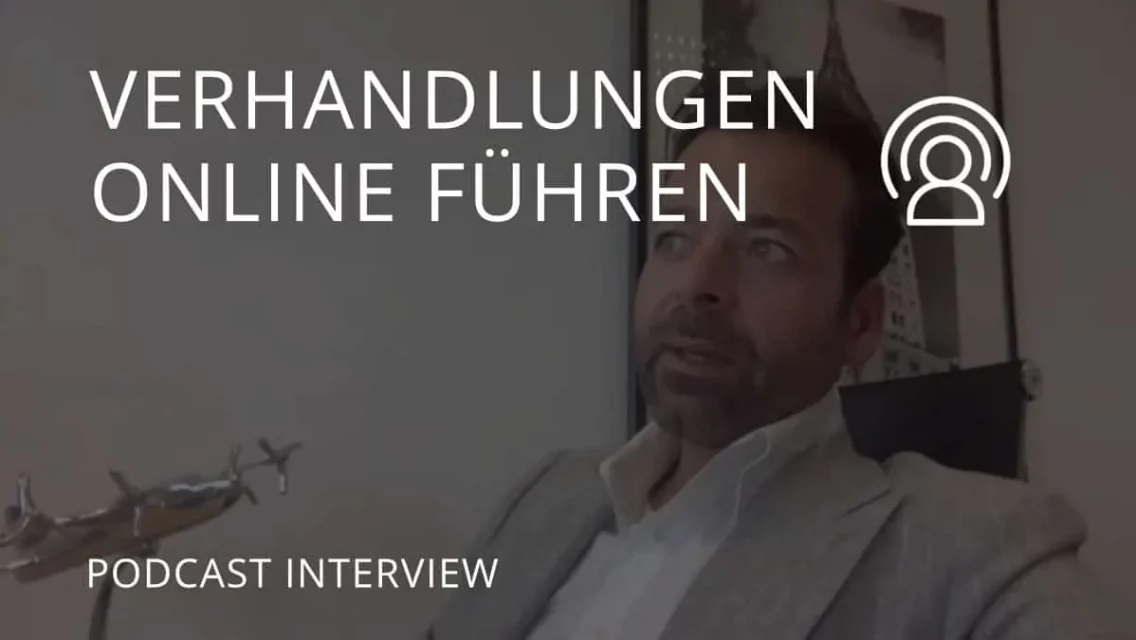In this podcast episode, I spoke with Jack Nasher, professor at Munich Business School and faculty member at Stanford University, about his recent Forbes article and online negotiation training, and asked him the question: What’s next after the Corona pandemic?
TIPS FOR ONLINE NEGOTIATIONS
But before we get into that topic, I wanted to talk to him a bit about his article “The 10 Tips for Leading Online Negotiations” published by Forbes and asked him: what are the most important insights you shared with the world in this post?
“Online negotiations are not necessarily worse. We realized we could live without all the live meetings,” says Jack Nasher and continues:
Even though live meetings are good for socializing, you don’t have to fly halfway around the world for every handshake.
Of course, certain issues arise in online negotiations that individuals may not think of directly. Nasher offers the following tips on this:
The problem is: you only see a head and a torso. Also known as the ‘talking head illusion’. You can easily work against it by moving more, standing up or showing something.
In this way, a basis of trust is built up.
Another typical online problem is eye contact. If you look your counterpart in the eye on the screen, it looks to him or her as if you’re looking at his or her cleavage. Eye contact only occurs when you look directly into the camera. This may feel strange at first, but it leads to a better connection with our counterpart.
And what about negotiations where you don’t even see or hear your counterpart? In a written exchange, the differences in status are nullified. Hierarchies tend to fall by the wayside here. For people who have a lower status than their counterpart — i.e., employees who negotiate with superiors — or those who tend to be introverts, this is the perfect medium for negotiations. “The speech ratio changes completely. Instead of a speaking ratio of 80:20, it now becomes 50:50, but if you have a higher status and/or are particularly charismatic live, you should avoid this medium.
THE ONLINE TRAINING DEALMAKER PRO
In his online course, participants see the same content as the live participants. The complete live training sessions were filmed — including the lively discussions. Once a week, there is a Zoom meeting with Jack Nasher to answer questions and practice live. Real cases that participants send in beforehand are also discussed.
Jack Nasher first feared that it would be a second-rate training as opposed to the live training. But that’s not the case. In fact, it has proven to be a fundamental advantage that participants can consume the content at their own, individual pace. Especially more difficult chapters can be viewed several times. Nevertheless, everything is didactically structured and each chapter ends with a learning check.
When I asked what the feedback from the participants was so far, I got the following answer: “The participants seem to be satisfied. We just received a case of the finest craft beer from one participant.”
WHAT HAPPENS AFTER CORONA?
I asked what the economic impact of the Corona pandemic would be in the near future and whether there might be any positive effects. His answer was philosophical.
The problem with forecasts is that they always concern the future.Prof. Dr. Jack Nasher
However, he does not believe that our lives will change permanently. We will quickly return to normality. People are creatures of habit and will therefore again quickly take most things for granted. But if we become more aware of just a few things in the future, that’s already worth a lot.
The interview was conducted by Mirko Herrmann of NEXTIM Inbound marketing
INTERESTING LINKS
FORBES article “10 tips for conducting online negotiations” (German)
FORBES article “How To Negotiate Via Email
Wikipedia article on “Eggs-Benedict”.
Book tip: Factfulness. How we learn to see the world as it really is (Hans Rosling).

